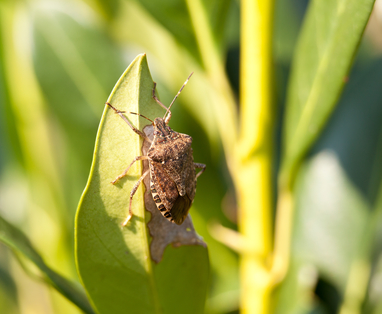Stink Bugs -They Eat Fruit And Multiply!
- Esther M.
- Aug-15-2019
- Stink Bugs
With the infamous reputation that stink bugs have garnered, it’s hard to believe they’ve only been in the United States for a little over 20 years! Ever since they allegedly came over on some shipping containers from East Asia, they’ve followed the command to “be fruitful and multiply.” Pun intended, considering they enjoy feasting mainly on fruits, but also suck the juice from plants and seeds. So if you have a garden or ornamental trees or live in a house, you may want some info on these shield-looking insects.

Stink bugs are about three-quarter inches long and have a triangular shape. They start off as eggs, and then they hatch into nymphs. After going through about five stages of mottling (shedding their skin) and developing wings, they are considered adult stink bugs.
The stink bug earned its name from its tendency to release an odor when disturbed or when crushed. Many other insects have these same characteristics, including some species of ants, beetles and other bugs. Read more at Pest World…
These traveling insects began their American “road trip” in Pennsylvania, but have since spread to at least 44 States, though they are more prevalent in the State of Georgia. In fact, it seems stink bugs have a thing for Georgia – you’ll see why momentarily. So, stink bugs are interesting-looking, don’t smell great and are vegetarian (they don’t bite or sting humans). Why should we be concerned?
“We have approximately 15,000 hectares [37,000 acres] of hazelnuts in Abkhazia. As a result of the bug, more than 80 percent of our crops were damaged in 2018,” says Minister of Agriculture Amiran Kakalia. Read more at National Geographic…
The “bug” the Minister of Agriculture is referring to is the stink bug. Abkhazia is an Eastern European region in western Georgia (this is where the stink bug’s affinity for Georgia comes in). When stink bugs suck the juice from plants, seeds, and fruits, they inject saliva that rots and destroys said plant seeds and fruit. As a result, stink bugs are destroying orchards all over, not just in Georgia.
In the US they have been a nuisance to cotton farmers, apple farmers, peach farmers and more. The US Department of Agriculture is exploring natural predators that can get rid of or significantly reduce stink bugs. So far, there are certain birds and wasps that seem to be adapting to eating stink bugs.
Let’s move from the fields to the home. Stink bugs are usually active during spring and summer. Then, as the bears do, when it gets cold they undergo their version of hibernation, known as “diapause.” Their shelter of choice though is your house!
In winter, the bugs tend to find their way indoors, where their half-inchbodies tend to catch the eye of homeowners. Fortunately, they’re largely harmless, and are not known to carry diseases or be destructive to pets or property. (Crops are an exception: The stinkbugs can prove damaging to agriculture.) Read full post at Mental Floss…
Although stink bugs may seem harmless, they are annoying. These pests get into your house through broken screens or vents and around door frames, utility pipes, and ceiling light fixtures. To prevent having stink bugs as roommates during the winter, seal cracks around doors, windows, and other openings. It’s also important to repair any damaged screens.

If you already have a stink bug infestation or anticipate them showing up, this is the best time to contact Backyard Bug Patrol. Stink bugs begin “house hunting” in September and October. Call us today and we’ll spray your house with our 100% organic stinkbug control solution which kills and repels stink bugs. Bid those squatter stinkers bye-bye!
